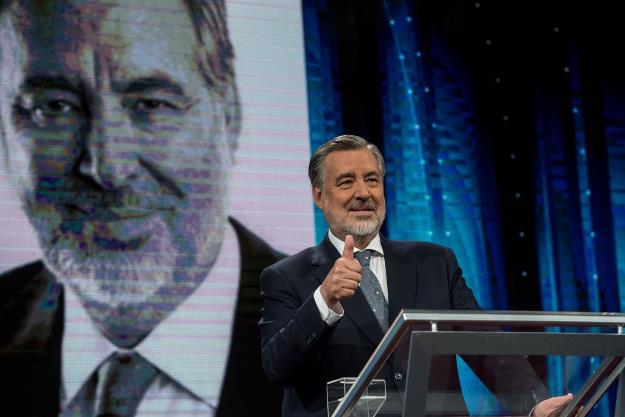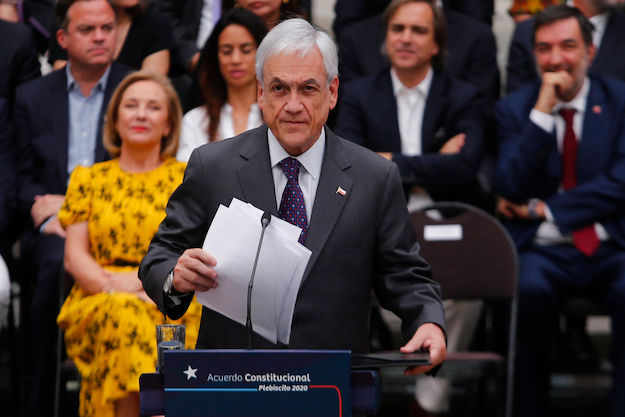Correction appended below.
Stumping in the central city of Concepción with 13 days to go until the Dec. 17 presidential election run-off, Alejandro Guillier’s rhetoric veered from leftist to provocative when he told the crowd that to pay for free education, his government would take from the wealthy, “so they can help build the country for once.”
He finished by invoking the words of Che Guevara: “Hasta la victoria, siempre.”
The reaction from business leaders was swift – and furious.
“Senator, what does not build a nation is fomenting hate, class warfare and division,” billionaire Andrónico Luksic said.
“Clearly, Guillier is not the candidate of growth and jobs,” said Juan Pablo Swett, head of entrepreneur association Asela.
The Guillier camp has since tried to reassure voters that his words were taken out of context, clarify his policies, and demonstrate their candidate recognizes the role of the business community in pulling the country’s economy out of the doldrums, where it has been mired for much of center-left Michelle Bachelet’s second, non-consecutive term.
In an interview on Sunday, Luis Eduardo Escobar, a member of Guiller’s economic team, stressed that the candidate did not plan to change the tax regime established by Bachelet, and has no intention of scrapping the private pension system, planning instead to create a public alternative.
Escobar also clarified Guillier’s stance toward the private sector, explaining he is not against business, but against favoring the interests of a specific group of businessmen.
“Guillier as a candidate has said it himself: 90 percent of investment in Chile comes from the private sector,” Escobar said. “If you truly believe in social and economic progress and you want to continue developing, you can’t be anti-market.”
In particular, Guillier and his team have been careful to highlight their allegiance to the policies that made energy the brightest segment of the economy during Bachelet’s tenure. The sector thrived under the leadership of her former energy minister, Máximo Pacheco.
Total investment in energy totaled $17 billion during Bachelet’s time in office. Most of the funding went to solar and wind parks, which received more investment than any other industry – including mining, the country’s economic engine. Competition for projects was fierce; energy prices dropped significantly, which helped keep inflation in check, and Chile proved that green power could be competitive with traditional energy without government subsidies. In his recent documentary on climate change, former U.S. Vice President Al Gore said that Chile’s energy revolution was “an inspiration to the world.”
Guillier has called for a continuation of the plans set out by Pacheco. His problem is that so has airline magnate Sebastián Piñera, his opponent in the election and a former president from 2010 to 2014. In fact, the two are peddling a very similar vision for that sector.
“Both programs have similar (energy) objectives,” Hugh Rudnick, the head of energy consultancy Systep, told AQ, explaining that these include converging toward a cleaner energy matrix, building a sound regulatory base, increasing competition from suppliers, and fostering rapid technological development in the areas of renewable energy and storage.
Another hindrance for Guillier is that outside of energy, Bachelet’s recent economic performance was lackluster. Chile has seen average growth of under 2 percent during her second term in office, compared to about 5 percent annual growth under Piñera. In 2016, government debt increased to 20 percent of GDP, double the level it was in 2011. As a result, the three main ratings agencies downgraded Chile this year – the country’s first downgrade in 25 years.
Beyond betting on the recent success in the energy sector, Guillier has done little to show he can turn the economy around, though he, like Piñera, has insisted he will double current growth.
Guillier’s final challenge is the fine balancing act he will have to perform in order to win. He needs to bring in hundreds of thousands of voters from the hard left – in the first round, the journalist Beatriz Sánchez, representing a new grouping of leftist parties called the Frente Amplio, came within a whisker of beating him to the run-off – but he also must appeal to the center. His solution, so far, has been to avoid committing to anything that might scare off voters from either end of the spectrum – with decidedly mixed results.
In the final debate on Monday night, he skirted around questions about inconsistencies in statements he and his staffers have made in connection to taxes and student debt forgiveness. At one point, he was asked, “so who do we believe, you, or your team?”
“Believe me,” he said.
This is hardly a way to win over voters in general, and in particular, the business community, which demands clarity on policy. The market has clearly shown worry at the prospect of a Guillier win. Financial services company Credicorp Capital forecasts 2018 growth of 2.8 percent with a Piñera presidency – but slightly less, 2.1 percent, if Guillier wins.
Everything indicates that this will be one of the most closely contested elections in Chile since its return to democracy. The good news for Chile – the largest producer of copper on the planet – is that copper prices are up about 25 percent year-on-year.
Whoever takes office in March will at least have that.
This article has been updated to correct the spelling of Hugh Rudnick.
—
Lenton heads energy coverage at BNamericas in Santiago, Chile, where he also writes a regular column and edits the Intelligence Series, a monthly publication of six industry reports on Latin America









